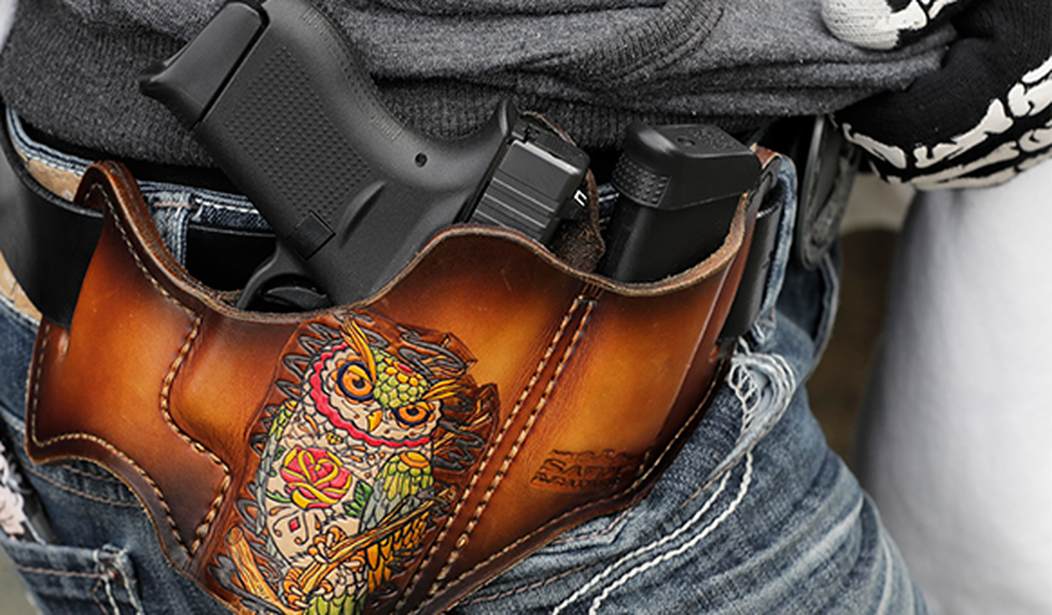The right to keep and bear arms should include, you know, bearing arms. However, concealed carry permits are fairly common. Even constitutional carry states offer them, mostly for reciprocity.
The issue is that reciprocity is a state-by-state thing, where some states will accept some states' permits but not others. It creates something of a confusing mess, one that's easier to navigate thanks to the internet, but only if you know you need to be aware of things.
But President-elect Donald Trump promises to change all that by signing national reciprocity into law.
Over at Newsweek, they decided to take a look at what that means for gun rights.
The NRA and other pro-Second Amendment groups support loosening concealed carry laws nationwide.
The NRA's official policy goes even further than Trump has promised, advocating for what they call "constitutional carry," which would allow individuals who can legally possess guns to carry concealed firearms without needing a permit.
This more lenient policy is also supported by other pro-gun groups, including the National Association for Gun Rights.
...
President Joe Biden enacted various policies to try to stem gun violence throughout his presidency. Trump has promised to undo them.
"In my second term, we will roll back every Biden attack on the Second Amendment—the attacks are fast and furious—starting the minute that Crooked Joe shuffles his way out of the White House," Trump told a meeting of NRA members in May.
Kamala Harris, by contrast, ran on a campaign of tightening gun control, including introducing universal background checks and an assault weapons ban.
Trump has signaled that he intends to loosen gun control laws through executive action and replacing Steven Dettelbach—branded by the President-elect as an "anti-gun fanatic"—as head of the Bureau of Alcohol, Tobacco, Firearms and Explosives.
After Tuesday's election, when Trump won the presidency and Republicans have taken control of the Senate. Control of the House of Representatives still hangs in the balance, with several races still yet to be declared.
If Republicans secure the House as well, Trump and his party could pass legislation seen by many as controversial, without significant opposition from Democrats.
As of this writing, Republicans only need to secure four of the remaining seats to lock in the House majority, and they're leading in more races than that, though a couple of them are legitimately close enough that a recount might make some sense. Others aren't, such as the four California Republican incumbents leading in their districts.
Of course, what this report doesn't really do is answer its own question. All it does is reframe the national reciprocity debate, then say Republicans can just about do what they want on other gun laws, which isn't wrong, necessarily, but it's not a discussion of how this might impact gun rights.
So, I guess that's why you all have me.
Don't you all feel fortunate? </sarcasm>
The short version here is pretty simple. The doomsayers have been claiming that requiring California to accept Georgia's concealed carry permit--a more restrictive state having to accept one from a less restrictive state--will make California less safe. However, if national reciprocity happens, what we'll see is...nothing. Nothing at all.
There aren't enough people traveling to California and wanting to carry guns for armed citizens stopping criminal actions to show up in their statistics, so what we'll see is a big old nothing at worst.
But that nothing is enough.
If the anti-gunners are going to go on and on about how it'll make these more restrictive states less safe, only the violent crime rate isn't impacted in the least, then it proves they were wrong. It's just that simple. While the media won't talk about it, the evidence will be there for anyone who wants to look.
And I intend to make them look anyway.







Join the conversation as a VIP Member